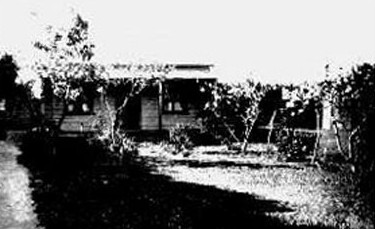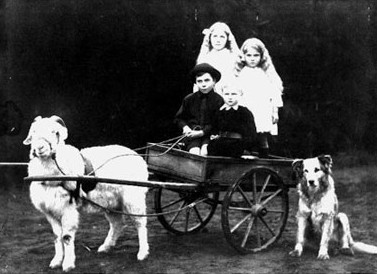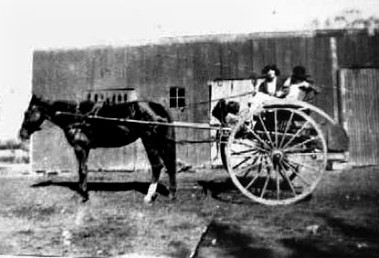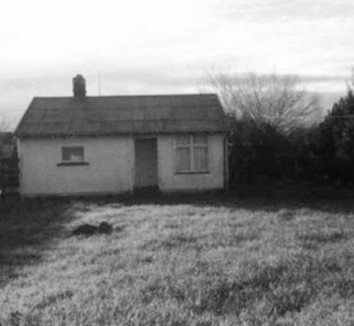EARLY MARRIED LIFE THE 1900s
by Sister Mary St Martha Szymanska
Mary Schimanski had a good view of her new aunt Martha as the Old Folk drove their horse and cart past Marshland School with her uncle Albert and his new wife.
The “Old Folk” were Christianus and Louise Szymanski, who had lived in Marshland since they arrived in New Zealand on the firth of forth in 1883. Albert was the youngest of their seven children. Martha had left her Dodunski family in Inglewood when she married Albert there on 21 May 1907. The young couple had travelled by steamer from New Plymouth to Lyttleton and by train to Christchurch to start their life together among the large Schimanski family and the rest of the Polish settlers who had arrived in New Zealand from 1872.

Mary (later Mary Magdaline Marsh) was the daughter of Mick Schimanski and lived next door to the newlyweds after Albert’s parents helped them build a house on the farm next door to Mick’s. This house became 393 Prestons Road, photographed by Gertrude Schimanski who was born there in 1909.
The road led to a lane and into property belonging to Sir Jack and Lady Armstrong. Albert was introduced to Jack Armstrong, who asked him to do some work for them. Jack asked Albert to call him ‘Sir.’ Albert replied, “If you want me to work for you, you are Jack Armstrong to me, and Jack you will be.”
Martha had one ambition when she married—to live on a piece of land cleared of trees, stumps and debris—so she was delighted when she saw the cleared land she was to call her home. Years later after many hours of weeding her husband's rows of seedlings and vegetables Martha was not sure whether her dream had been the best one to have had, yet she spent many happy years working in the fields beside the man she loved.
After about three months Martha became very homesick and Albert sent her back to Inglewood for a holiday with her family. After that she was happy to return to her new husband and new home.
When Albert and Martha’s first child, Les, was due to be born, Mick Schimanski’s wife, Annie, was called in. She was known as the District Nurse and everyone in the area called on her to deliver their babies. When the second child, Gertrude, arrived soon after, Grandmother and Grandfather Dodunski (Mathias and Apolonia) thought two babies were too much for Martha so they came and took Les back with them to Taranaki for a while.
When Les was four and back with his mother and father the little boy thought he was not getting a fair deal as son and heir and competition for notice was getting too much. (By then there was also baby Theresa vying for his parents’ attention.) Les took off and was found, as he explained, walking back to Taranaki where life was better with Grandmother and Grandfather.
This episode taught Albert and Martha a great lesson and a young relative was employed to help. There was always a midwife in the house for the first few days when a new baby was born, then Dad (Albert) and the family seemed to manage. The first seven of Albert and Martha's 10 children were born at home. Aunt Augusta, Dad’s older sister, was in attendance when Douglas, the seventh child, was born.
All the children were nearly two before they were weaned off the breast. Reginald would take his mother into a corner to seek refreshment. I was told I was big enough to push a stool or chair around the room following my mother and thumping the seat saying, “Mum, Mum, Mum,” until Mum sat down and I could climb up and have my drink. Clifford had a saying, “Inka, Inka” whenever he wanted a drink and he would follow Mum about pulling at her dress. Years later we can all say it was well worthwhile. We all lived healthy young lives and immune from most ills such as measles and chicken pox and have had good healing qualities from wounds.
In our family, to be sick and in bed was almost unheard of. One old Polish woman told me, “In the early days we lived so far away from town and transport was by horse and cart or on foot and of course the horses were needed for working on the farm so we tried hard not to be sick.”
There was never any shortage of food and always had geese to eat. The early Polish settlers in Marshland had their market gardens and my parents became part of this community. Parents made sure of healthy children by feeding them with good food such as plenty of fresh garden vegetables. In our home we always had plenty to eat, nothing fancy but good wholesome fresh garden food. The vegetable garden was always so much part of our home that I still think that something is missing if there is no vegetable garden.
A niece of Albert's was employed as a house nurse and odd-job maid. She stayed for a number of years until one day she was seen to yank a small child by the arm. This was not acceptable to Martha so Gert was sent to collect the child, the niece dismissed and Gert became the official helper and baby sitter. The niece later married a first cousin of Mum’s but never bore children. My Mum in turn was very kind to her. As the niece grew older she experienced a wandering illness, her housekeeping and health suffered and she often came to stay on the farm in Taranaki. Mum saw that she had plenty of good food and looked over her clothes, washing and tending them before she went back to her husband.
As a young wife and mother Martha found it hard to cope with her small but growing family so Grandmother Dodunski would travel down to visit, giving her daughter support and comfort and making sure she was managing. There were never any frills in the family, only the bare necessities—like any other Polish family in Marshland at that time.
In our family there always seemed to be a shortage of clothes. There were not many clothes to wear at all. The boys never had underpants and never wore pyjamas. Obviously Grandmother Dodunski did not think that the children had sufficient warmth at night either because she made sure we had feather eiderdowns. Granny would get the boys to catch the geese so she could pluck the birds and make feather eiderdowns with their down. On the Durham Road farm [south of Inglewood, Taranakai] as a child I often helped my mother with her plucking of geese for their down. It was her ambition to have an eiderdown on all the beds in the house made from the down of the geese we killed and ate.
Martha did all her washing in Marshland in an outside copper, carrying the water from the tap to rinse the clothes in tin tubs on a bench under the trees. The clothes were rung by hand, sheets and towels needed two people, one at each end to ring out the water. Martha had to bucket the water from a copper. Albert dug a ditch so all Martha had to do was tip the tub up and the water would go away down the drain. When the family moved to Taranaki a similar pattern continued for a number of years, except the washing was done in the woodshed in a tin bath and a washing board. Hot water came from a copper at the end of the shed where some clothes were boiled. One day Albert came home to find an agitator washing machine sitting in the kitchen. The water came through a hose from the tap above the kitchen sink and was drained out through the same sink.

In Marshland Albert already had the goat the family named Billy when he won this cart in a shilling raffle. Les and Vic are in the front and Gertrude and Theresa standing behind. Billy easily pulled bags of potatoes out of the potato paddock. Dad had a bet with the next-door neighbour that his goat could pull two big bags of potatoes in a cart. The goat showed its worth when it pulled two bags weighing 400lbs out of the paddock. Les used to harness Billy in the cart and drive down Prestons Road to his cousins the Boloskis. At one time Billy and the cart were the most photographed item on Prestons Road.
My grandfather Christianus (Chris) Schimanski gave both his sons John and Albert some land, which they eventually paid off. He gave John a farm of four or five acres on Marshland Road. When my father married he received the seven acres on Prestons Road. Dad used his land and energy for market gardening, cropping the biggest part of six acres on which he grew mostly onions, potatoes and lettuce. All the family enjoyed the onions. After World War I in 1918, when the black ’flu ravaged the country, no child in Albert's family contracted even a sensation of the virus.
In 1988 when I attended the centennial celebrations of the Marshland School it was recorded by a former teacher, a Miss Gill, that a visitor had only to enter the school rooms to notice the aroma of onion and they were left in no doubt as to what caused it. She said the Marshland School had the healthiest pupils she had ever taught. It was also the only school that was not closed during the ’flu epidemic of 1918.
At 393 Prestons Road it was a different matter because Mum and Dad got the ’flu and had to go to bed. They couldn’t work and could hardly move. Les was about 10 at the time and with Gert, Theresa, Vic and Phil they kept the house operating. Everyone helped to feed and milk the cows. Frank Gibbie was working for the family at the time.
Dad would plant three or four big rows of onions and a quarter of an acre of parsnips and let them go to seed. The seeds were collected when they were dry and flayed on a large tarpaulin. The next step was to put them through a sieve and let the wind blow away the shells. Mum would do this.
Dad would dig a pit four feet wide and layer it with straw. He would put his potatoes on top of that and repeat with more layers of straw, potatoes and straw and then cover the last straw later with earth. Les remembered his father selling carrots at £2 10s a ton and onions at £6 to £8 a ton.
Albert always grew in opposition to the market. If onions were scarce, the price would go up and other growers would plant extra. Not Albert—he would grow the same amount of onions as before but put in something else and would make money from that crop. The price of onions would fall because they were plentiful. The following year Albert would grow extra onions because other growers would not grow so many after the price had fallen.
Onions were sold by the string at the market. Vic told me that to make a string of onions you need to use two strings, the string is twisted around the onion and pushed down and on to the next one. The string holds the onion down and they will not come off until you pull on the onion you want and it would come off easily. Once when a man came to the farm wanting onions Dad sold him all he had for £10 a ton. Dad’s brothers would not sell as they said they could get more than that for theirs. However the buyer must have had all he needed with Dad’s onions and when the prices went down his brothers had to sell their onions quite cheaply. Potato pickers received a shilling a bag. The boys would gather flax and sew up the potato bags.
The contractor who ran the night cart used big slow horses that plodded along pulling a wooden cart with a big box that opened at the back. After school the children would see the night-cart men going to work. They would be asleep on the cart as the horses plodded slowly along. If a farmer was willing to cover up by ploughing before sun-up the contractors would empty their refuse into the paddocks. This agreement helped the Marshland swamps to become good, rich, fertile soil for market gardening, When it was Albert's week to have the refuse he was up at four o'clock to plough it all in before sunrise.
Dad raised some pigs on the Prestons Road property. He used to bring home food scraps from a hotel to feed them. One day he bought home two or three barrels of hops that had gone sour and tipped the whole lot out into the pig’s trough. Not only did the pigs drink their fill but the fowls got in on the party too. There was such an unusual sound coming from the pigpen that the children went down to investigate and then ran back into the house calling out to Dad to come quick and have a look. The fowls were flapping and squawking all over the place and the pigs were rolling over drunk and squealing and grunting. The children were horrified but Dad thought it was a big joke.
I do not know how Dad managed to bring up a family of seven on such a small piece of land. He and everyone had to work like slaves, Les said. The farm on Prestons Road grew to include horses, cows, bees and an orchard. Albert built two substantial sheds, one for keeping horses with a large shelf-box for chaff. The other long shed had four compartments and a sliding door that opened on a hinge and roller. He built a separate tackle shed and another for fowl food and bags of chaff and a second shed for horses. There were rows of poplar trees and there seemed to be drains everywhere. Dad built a whare [Maori house] for the boys to sleep in.
The Kerr family opposite had a poultry farm. The Slade family next door had one of the many small milk runs in the neighbourhood.
Dad bought a milk round with 20 milking cows. Vic helped Dad to build the cowshed and dairy. The inspector came around and said it was a “nice little shed and dairy.” Later the same inspector found fault and asked that it be changed but Dad didn't do anything about it. Those 20 cows had to be milked by hand, so Les, Vic, Mum and Dad all took on the milking. Les was the first to take charge of the milk run and then Gert took it over. Vic helped them both.
The milk was kept cool overnight by putting the cans of milk in a bath of water. The old horse and milk cart would pull up at the door of a house and a knock would bring the customer out with a jug. The required amount of milk was poured out of the can. Dad also bought 50 gallons a day from a dairy farmer. This cost him 10 pence a gallon and the customers were charged 16 pence a gallon.
Gert was nearly 16 when Les left home so she took on the work of the milk run. Not knowing the milk run customers thoroughly, now and then a customer or two would get missed out. The horse knew where to stop better than she did so all she had to do was to follow the horse. Reg then helped Gert and he loved collecting the money. Customers often left the money under the milk billy but when there wasn’t any money there Reg would ask, “When do you pay, lady?”

With Gert in this photograph is her friend Violet Gottermeyer on the right and sitting in the front is Ngaire, the eighth Schimanski child, and the last born in Marshland.
It was evening and Gert had to take two cans of surplus milk to the milk depot in Christchurch. The passengers were there for the photo and not for the journey. There was only one seat for the driver and the rest of the space was used for the cans of milk. Gert did her usual milk runs around Christchurch in the mornings. This is the same shed where Doug discovered the grain for feeding the fowls. [See early childhood in marshland.)
Home milk deliveries were eventually banned and the milk had to go to a milk treatment station in town where it was bottled before delivered. Vic and Phil took the milk in the evening to the station until Dad sold the milk run.
Peter Gorinski and the Rogatskis all farmed around this area and leased land. Albert decided to lease forty acres from John Polks.

Cliff Schimanski, Albert and Martha's youngest child, took this photograph of the house around 1977. By 1980 it was gone.
As Dad made money he bought land and began by adding ten more acres to his existing seven on 393 Prestons Rd. This cost him £200 an acre. Then came 20 acres opposite the Bottle Lake Hospital belonging to Mr. Polks, rough land covered with lupins and used more for the running of horses and ponies which kept the children busy as they all loved riding. Vic remembers helping his Dad to burn the lupins and clear the land. Then Dad built a house on it and rented the land to a man who kept racehorses.
All this area was peat but opposite 393 Prestons Road was a tennis court on a sand knob, the only place where there was sand in Marshland. Dad said he would buy it when his horses made some money. Eventually Bottle Lake farm sold for £100 an acre. Dad also bought five acres near the Styx River. This land had a lot of flax on it and quite good by the river where it was flat. Dad ended up with about seventy acres of land in Marshland.
Les used to try smoking and he would go into the gorse paddock. Dad would worry he may set the gorse on fire. Les said the Prestons Road house was big, with four rooms. Most of the time he slept out in the whare on his own except when Frank Gibby worked for Dad, when the two shared the room.
© Sister Mary Saint Martha Szymanska, updated June 2017.
ALL PHOTOGRAPHS FROM THE SCHIMANSKI COLLECTION.
